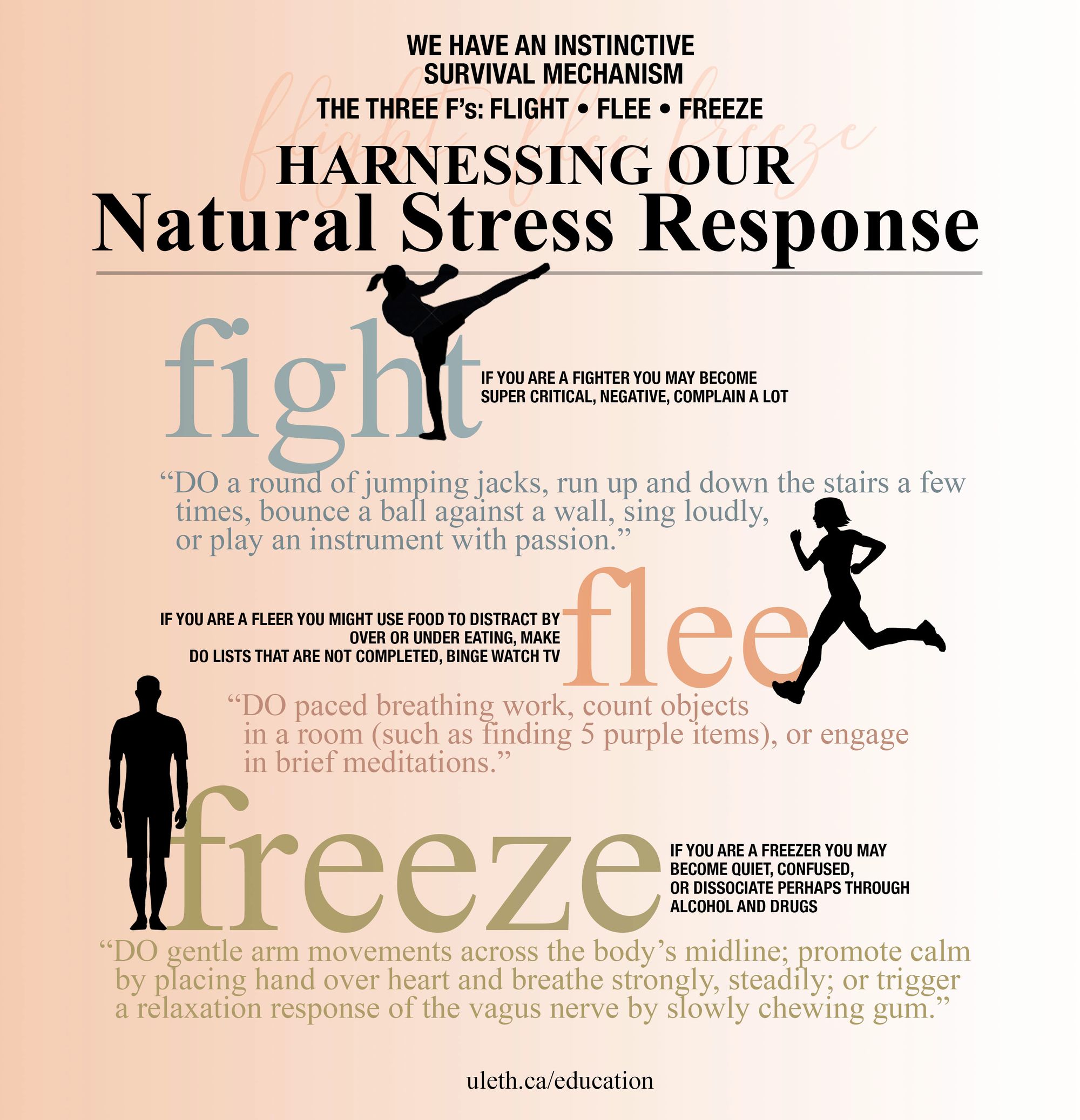This story is part of the Faculty of Education Wellness Initiative: Supporting a Focus on Health and Well-being.
During the COVID-19 pandemic, when change and uncertainty run rampant, it is comforting to remind ourselves that we are designed to be remarkably adaptable and resilient. By nature our bodies are equipped to self-heal, and our brains are programmed to protect.

“Each 3F has its own job,” says Dr. Dawn McBride, registered psychologist and associate professor in the University of Lethbridge Faculty of Education. “Our 3Fs are triggered by many things, including anxiety.” During the COVID-19 crisis, when anxiety is high, McBride notes that we have a tendency to default to the fight, flee or freeze response that most reflects how we typically coped with stress before the pandemic. “Someone with the flee response might avoid taking action to reduce their anxiety,” says McBride. “They might use food to distract, over or under eat, make do lists they don’t complete, and binge watch TV or Netflix, all motivated to stop feeling anxiety. These strategies work but they do not discharge the energy associated with being triggered, nor do they offer long-term solutions to an activated nervous system.
“We are wired to bounce back, but first we have to help our nervous system receive a message that despite being uncomfortable we will survive. We are ok.
“A fighter, when highly anxious, can become super critical, tend to focus on the negative, expect the worst, and complain about things that are usually outside their ability to control.” Those who freeze do the opposite, they tend to shut down by becoming still and quiet, they report feeling confused, not able to think clearly, and may even seek ways to dissociate and numb, perhaps through alcohol and drugs.
“I am a fleer,” says second year Education student Dana Visser (BMus’19), who was student teaching at G.S. Lakie Middle School in Lethbridge when the pandemic hit and classes were cancelled. “I took it quite hard when my dream practicum experience got cut off very suddenly.” She found herself eating from boredom, binge watching TV, and avoiding anything to do with school or work because it exacerbated her anxiety.
“These are survival responses designed to reduce the threat in the short term, but they are not healthy to depend upon,” says McBride. She recommends alternative coping strategies that allow for healthy discharge and connection with others. “A fighter benefits from actions that promote big discharge, such as doing a quick round of jumping jacks or running up and down the house stairs a few times, bouncing a ball against a wall, singing loudly, or playing an instrument with passion and flair.”
“I stress-cleaned my entire house,” says Visser of her own need to discharge. McBride adds that fleers also benefit from engaging in paced breathing work, counting objects in a room (such as finding 5 purple items), and engaging in brief meditations. Her own favourite meditation app is Headspace.
Freezers can be helped to re-establish balanced brain functioning through gentle arm movements that cross the body’s midline; promote calm by placing a hand over their heart and breathing strongly and steadily through their heart centre; or trigger a relaxation response of the vagus nerve by slowly chewing gum.
According to McBride, healthy coping strategies allow us to tap into our inherent resiliency. “Resiliency is bouncing back, even when you still feel discomfort, and not depending upon your 3Fs,” she says. “We are wired to bounce back, but first we have to help our nervous system receive a message that despite being uncomfortable we will survive. We are ok. In this moment, right now, we are safe. The goal while in this global health crisis is not to chase feeling calm, but rather to build confidence that ‘I will survive this.’ Once we can start taking control of what we can control, hope returns and thriving is reactivated.
LINKS
Canadian Mental Health Association:
https://cmha.ca/news/covid-19-and-mental-health
Crisis & Trauma Resource Institute free handouts:
https://ca.ctrinstitute.com/resources/free-handouts/
Synergetic Play Therapy Institution free webinar: Regulating through the Coronavirus:
https://learn.synergeticplaytherapy.com/product/regulating-through-the-coronavirus/
Beacon House Fight/Flight/Freeze aids:
https://beaconhouse.org.uk/wp-content/uploads/2019/09/What-Are-You-Feeling-Freeze-Collapse.pdf
https://beaconhouse.org.uk/wp-content/uploads/2019/09/What-Are-You-Feeling.pdf
YouTube videos:
https://youtu.be/agdpFsKGdOE
https://youtu.be/15b3gllWLLc
https://youtu.be/jEHwB1PG_-Q
https://www.youtube.com/watch?v=mtRrxNTnyh8
https://youtu.be/MJJdCFEsGNU
________________
Related story links to the Faculty of Education Wellness Initiative series:
• The Faculty of Education WELLNESS INITIATIVE: Supporting a Focus on Health and Well-Being
• Wellness is Stillness: Jane O'Dea (dean emerita)
• Wellness is Coping with Stress Through Art and Music: Jenn Pellerin
• Wellness During the COVID-19 Experience, PSII, and Staying Connected: Kelsey Shoults
• Twitter Education Community: Books are a Form of Wellness
• Wellness is About Having a Consistent Routine: Alex Funk (BEd '17)
• Wellness is Spiritual: David Slomp
• Wellness is Ranching: Danny Balderson
• Coping with COVID-19: Loneliness
____________
Writer: Elizabeth McLachlan | Infographic Designer: Darcy Tamayose
Learn more about the Faculty of Education: Legacy Magazine (2008-2019)
Twitter: @ULethbridgeEdu Website: ulethbridge.ca/education
BecomeaTeacher.ca | BecomeaTeacherAssociate.ca | EdGradStudies.ca